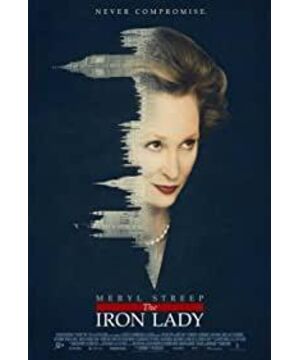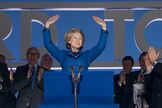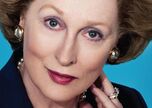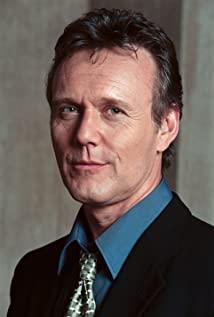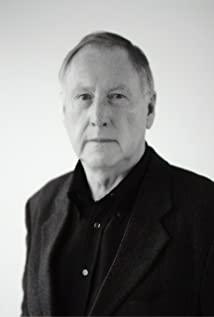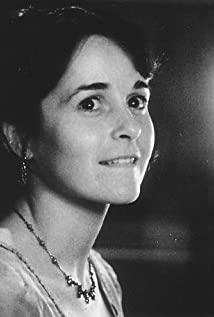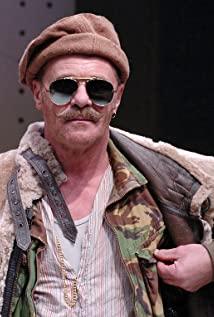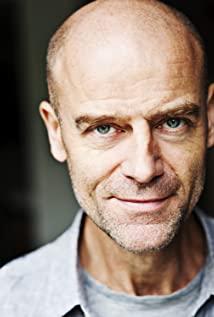The nickname "Iron Lady" actually came from the teasing of Soviet military newspapers, but Mrs. Thatcher liked it very much, and the irony of the Cold War enemies just reflected her indomitable character. Indeed, in the movie, the "Iron Lady" also said the famous line "I have been fighting all my life". The grocer's daughter, by virtue of her own efforts, took the position of Prime Minister of the United Kingdom step by step, becoming the only female Prime Minister in British history, and the longest-serving prime minister in the 20th century, which has already left a shining page in the annals of history. .
The screenwriter and director of "Iron Lady" are all women, coupled with "acting goddess" Meryl Streep's loving interpretation, it can be described as "three women in one play". Meryl Streep's acting skills in the film can be called perfect, from the vivid British accent to the complex and tangled inner drama, all of which are vividly displayed, which can be called a performance textbook for contemporary movies, and won the Oscar for Best Actress. To the name.
The whole "Iron Lady" is connected by the fantasies and memories of the elderly Mrs Thatcher. Mrs Thatcher, who was idle at home, became more and more lonely after the death of her husband, and gradually fell into a state of madness in the early stage of Alzheimer's disease. She can always see The dead husband was chatting with him, and in a trance, the past would come to Mrs Thatcher's eyes one by one...
Influenced by her father since childhood, Mrs Thatcher developed a strong interest in politics, and admission to Oxford University became her stepping stone to the political world. In the film, when Mrs Thatcher received the admission letter, the whole family cheered, and the mother who walked out of the kitchen was embarrassed to pick up the letter because her hands were wet, which shows how important Oxford's halo is for a commoner.
Margaret Thatcher majored in chemistry at Oxford University, but she was not interested in the profession, but was active in politics, and served as president of the Oxford University Conservative Party Association - in Margaret Thatcher's words, "Politics has become integrated into my blood." After graduation, her marriage to the divorced wealthy businessman Dennis Thatcher gave her an important guarantee for politics. Because of her husband's wealthy family background, Mrs. Thatcher began to study law full-time and qualified as a lawyer, and was then elected to the British House of Commons— - The United Kingdom adopts a constitutional monarchy. The majority party in the parliament can form the cabinet, and the cabinet members are also selected from the members of the House of Commons, which means that Margaret Thatcher has entered the highest power field in the United Kingdom. The film uses a very symbolic image to show the process of Mrs Thatcher's entry into the House of Commons: surrounded by black men, a woman walked to the parliamentary hall with difficulty; behind the rows of neat and shiny men's leather shoes, Hiding a pair of ladies high heels.
However, the acquaintance and love between Mrs Thatcher and her husband were not directly expressed in the film, and the emotional steadfastness of the two was contrasted mainly through the hallucinations of the elderly Mrs Thatcher. As for why Mrs Thatcher was able to run for parliament successfully, the film did not have any ink - in fact, it took Mrs Thatcher 9 years and 3 elections to finally succeed, and her marriage and family were also during this period. It is a pity that the film does not elaborate on this crucial stage, which is a pity.
After a long period of parliamentary experience, Mrs Thatcher gradually gained a reputation as a powerful debater in parliament. It only took her two years to upgrade from a "backbencher" to a "frontbencher" (a member who sits in the front row to participate in the debate) , and served as Minister of Education and Science in the Conservative Cabinet in 1970. So, we see that arrogant "fashion devil" resurrected in the British Parliament lobby, impassioned and scolded Fang Qiu - only this time with a strong British accent.
Since the narrative of the film is mainly structured through flashbacks, there is no transition in the ordinary sense. Of course, the "Iron Lady"'s determined personality has never changed. When she announced her intention to run for prime minister, both her husband and daughter showed great anger, but Mrs Thatcher made up her mind. Soon, with the help of colleagues in the party, the "Iron Lady" changed her hairstyle, changed her jewelry, and learned her pronunciation. In order to make her speech more moving and "sound like an authoritative leader," Mrs Thatcher followed the lines. The teacher raised his arms and shouted over and over again. This scene can't help but remind people of the stammering King in "The King's Speech" who learned to speak normally. Interestingly, the investors of these two films have Weinstein Company, both It was the company that hit the Oscars.
At that time, the United Kingdom was facing the threat of terrorist attacks by the Irish Republican Army. The movie recreated the scene where Mrs Thatcher witnessed the death of her best friend in a car bomb, and she also witnessed the scene of the bombing of the Brighton Hotel. But Mrs Thatcher Throughout his life, "fighting with people is endless fun", and when confronted with strength, he is stronger, and he never compromises with the enemy. Margaret Thatcher, who entered Downing Street, immediately pushed forward her economic policy aggressively, but the radical privatization process and the drastic reduction of social welfare also triggered a violent backlash in society, which made Margaret Thatcher's approval rate for a while. In the end, Mrs Thatcher was unshakable, and finally the British economy came out of the quagmire and recovered strongly. At this time, the Argentine military government sent troops to capture the Malvinas Islands (Falkland Islands). Although military spending had been greatly reduced, Mrs. Thatcher was determined to send troops to take back the Falkland Islands. This is also the most impressive stroke in the film. Even in the face of the persuasion of American allies, Mrs. Thatcher expressed her confidence that she will be killed even if she is far away. He won the battle for the Falklands, and his reputation reached its peak.
The smug Mrs Thatcher, after 11 years in power, gradually diverged from her party colleagues because of her rejection of European integration. The face-to-face reprimand caused several important ministers to hang their crowns and leave. But Mrs Thatcher didn't care. She insisted on going out to visit during the party's primary election to "witness the end of the Cold War." As a result, there was a fire in the backyard and she eventually resigned. In the film, Mrs Thatcher broods over being forced to resign, and after years of retirement, she still denounces these former ministers in her hallucinations.
After the film was released, it caused a lot of controversy. Mrs. Thatcher and her family refused to watch "The Iron Lady". Meryl Streep had asked to meet Mrs. Thatcher before filming, but she was also rejected. In recent years, Mrs Thatcher has indeed developed symptoms of forgetfulness, but she still attended some social events, and the film simply portrayed Mrs Thatcher as Alzheimer's in her later years, which has been criticized a lot. Many former colleagues of Mrs Thatcher also said that Mrs Thatcher was never domineering at work, hysterical, and the description in the film was too exaggerated.
For the post-90s audience who have not experienced the Thatcher era, Mrs Thatcher in "Iron Lady" is a lonely and lonely old grandmother. After being quickly forgotten, he does not enjoy any privileges, and can only find his old "time like a fire" in hallucinations and memories.
The deceased husband in the hallucination finally left her, and Meryl Streep drew a sad ending to the film with a lonely back.
(Published in the 8th issue of "Blog World", 2013)
View more about The Iron Lady reviews


